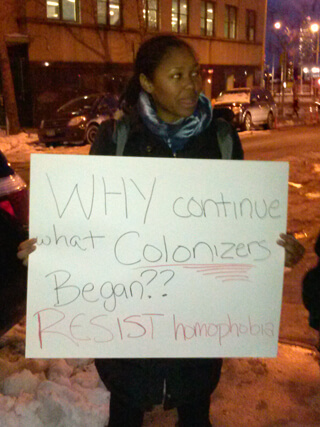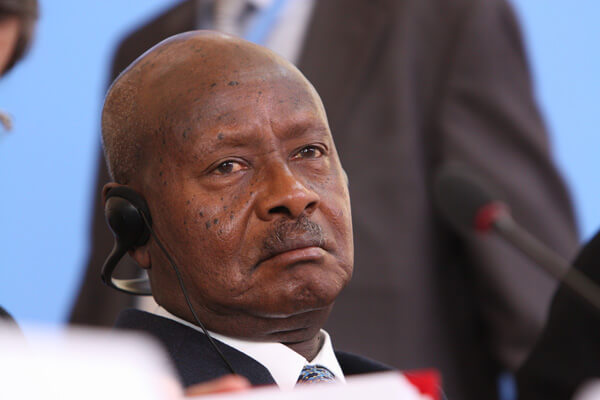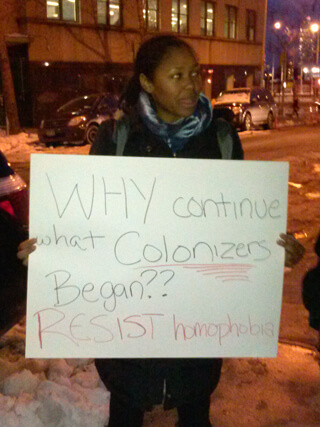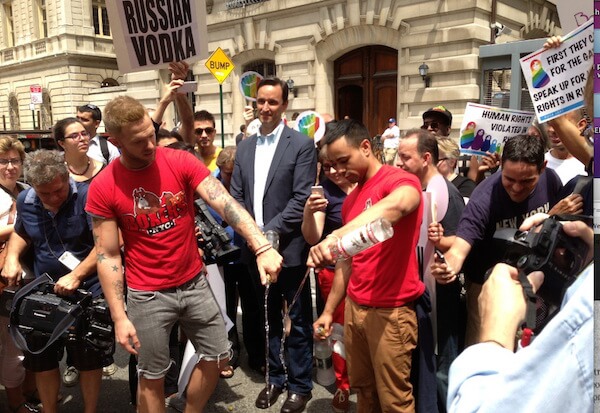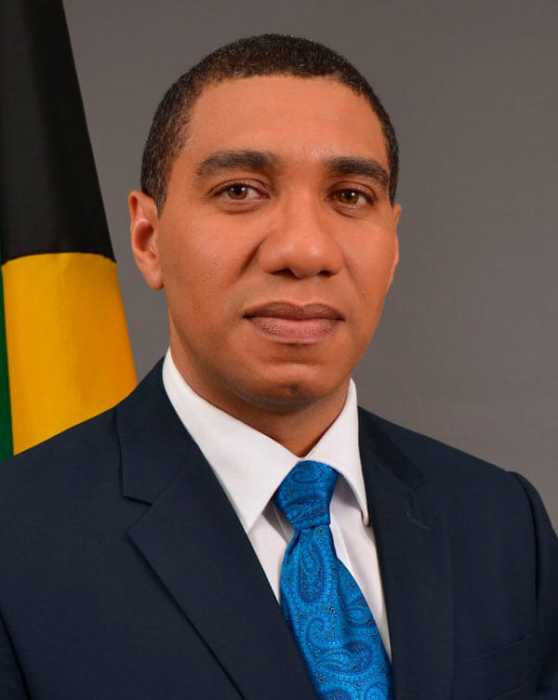Defying Western critics and worldwide demonstrations, Ugandan President Yoweri Museveni will sign a harshly anti-gay measure into law. The bill, passed in December, dropped death penalties from what had been dubbed the “kill-the-gays-bill” and substituted long prison sentences, including life in prison for contracting a same-sex marriage.
In a speech before a raucous crowd of supporters of the anti-gay measure, Museveni vowed, “We shall have a war with the homosexual lobby in the world.”
Passage of anti-gay legislation in Russia and Nigeria in recent months has sparked vigilante violence against LGBT people and there are signs of that in Uganda, as well, as LGBT people are identified as scapegoats for a wide variety of social ills.
The maximum penalty for homosexual relations in Uganda was already life in prison. The new law mandates seven years to life for sexual touching and five to seven years for “aiding and abetting” others to commit homosexual acts, a provision that UK gay activist Peter Tatchell said can include “membership and funding of LGBT organizations, advocacy of LGBT human rights, supportive counseling of LGBT persons, and the provision of condoms or safer sex advice to LGBT people.”
Yoweri Museveni promises “a war with the homosexual lobby in the world”
The new law also dictates three years in prison for failing to report within a day those who violate other provisions of the law. In addition, it applies to Ugandan citizens abroad –– subjecting them to extradition to Uganda for punishment –– and foreigners living in Uganda.
In a February 14 tweet, Ofwono Opondo, Museveni’s spokesman, called the law “a measure to protect Ugandans from social deviants.” He also wrote that “14 medical experts presented a report that homosexuality is not genetic but a social behaviour.”
The following day, the Monitor, a Ugandan newspaper, reported that the president also supports a constitutional amendment to deny bail to those arrested of sodomy as well as to “rapists and defilers.”
The Ugandan president –– echoing concerns voiced by other officials about irregularities in the parliament’s passage of the bill –– had originally hinted he would either not sign the bill or try to mitigate its worst provisions. He then wrote to the parliament, “Homosexuality and lesbianism, if not mercenary or out of social frustration (for sexually starved women), is an abnormality and must be treated as such” and not criminalized. He said he wanted scientific proof that it was “not genetic” before signing it.
The Robert F. Kennedy Center for Human Rights organized 200 scientists and mental health professionals to write a February 3 letter to Museveni on the nature of sexual orientation.
“For the vast majority of people, homosexual and heterosexual, sexual attractions emerge spontaneously without any prior sexual experience, exposure, or recruitment,” the letter stated. “Sexual orientation is not a matter of choice.” The professionals also advised Museveni that “homosexuality is not a mental illness,” which is not what he wanted to hear. He obviously listened to quacks in the end.
Uganda is 85 percent Christian, mostly conservative Catholics (42 percent) and Anglicans (36 percent) with a rising number of Pentecostals (five percent). Scott Lively, the American head of the right-wing Abiding Truth Ministries, is alleged to have played a major role in crafting the anti-gay legislation in Uganda. He is being sued in US federal court over his actions by Sexual Minorities Uganda (SMUG), the leading LGBT rights group in that nation, through the Center for Constitutional Rights in US federal court.
There was a Global Day of Action Against the Anti-Homosexuality Bill on February 10 after Ugandan activists from SMUG called upon Western supporters to take the gloves off and publicly demonstrate against the bill as Museveni’s decision about its fate neared.
In New York, the American Jewish World Service (AJWS), led by its president Ruth Messinger, a longtime LGBT rights supporter who was accompanied by 40 people, delivered a letter to the Ugandan Mission on East 45th Street early that day urging Museveni to veto the bill. The letter was signed by 500 rabbis, including Sharon Kleinbaum of Congregation Beit Simchat Torah, the city’s LGBT synagogue,
Messinger, whose work often takes her to Uganda, said AJWS, since 2009, has helped fund SMUG, a group that now has to operate largely underground in Uganda. Messinger’s group is also helping fund the suit against Lively.
Messinger, a former Manhattan borough president, said that the anti-gay bill has been kicking around for years “and was never put to a vote” until parliament unexpectedly took it up at the end of last year.
“I think action in India [where the high court reinstated anti-sodomy laws] and Nigeria [where an even more draconian anti-gay law just went into effect] made them feel it was OK,” she said.
Despite Museveni's stated intention to sign the bill, AJWS continues to encourage emails to President Barack Obama urging him to pressure Uganda not to enact the law.
In a statement released by the White House on February 16, Obama said, “The Anti-Homosexuality Bill in Uganda, once law, will be more than an affront and a danger to the gay community in Uganda. It will be a step backward for all Ugandans and reflect poorly on Uganda’s commitment to protecting the human rights of its people. It also will mark a serious setback for all those around the world who share a commitment to freedom, justice and equal rights. As we have conveyed to President Museveni, enacting this legislation will complicate our valued relationship with Uganda.”
On a bitter cold evening February 10, about 20 stalwart LGBT activists picketed Uganda House, also on East 45th Street. The target of several LGBT demonstrations in recent years, including one responding to the murder of that nation’s leading gay activist, David Kato, three years ago, Uganda House no longer bears the large letters of its name over the door.
Nadia Swanson, who organized the action with SMUG and recently returned from working in Uganda, said that in recent years some police in Uganda had become more sensitized to the issue of anti-gay repression, so that if an LGBT person were arrested, SMUG “could call one of their allies to intervene.” All that may now be illegal under the new law.
Employees leaving Uganda House ignored chants of the demonstrators calling on Museveni to veto the bill and would not speak to Gay City News.
One man who did respond to questions was Dr. Francis M. Deng, who identified himself as South Sudan’s ambassador to the United Nations. Asked what the situation was for gay people in that nation which became independent less than three years ago, he responded, “The problem has not arisen.” He is described online as “an expert in US-Africa relations and conflict management” and was appointed by the very pro-gay Ban Ki-Moon, secretary-general of the UN, as his special adviser on the prevention of genocide.
Museveni, 69, has been president of Uganda since 1986. While he for a time allowed one of the more rational approaches to fighting HIV/ AIDS in Africa — bringing infection rates down from 11 percent in 1997 to seven percent in 2001, rates have gone up about 50 percent since then, especially among married couples due to sex outside their marriages.
In Nigeria this past week, Gay Star News (GSN) reported, a mob of 40 in the village of Gishri near Abuja, the capital, attacked 12 gay men with sticks spiked with nails right in front of police, who did nothing to protect them. The vigilantes then attempted to set fire to their houses and drove the gay men from the village. The police announced that all gay people have 48 hours to leave the village.
Nigerian activist Bisi Alimi told GSN, “The increasing attacks and witch-hunting of LGBTI people in Nigeria is now proving the silence of the international community is not golden anymore.” He called on the UN, the US, the United Kingdom and its Commonwealth of Nations, the European Union, and the African Union “to take a stand in the defense of vulnerable LGBTI people in Nigeria.”
In the lobby of Uganda House, there is a big banner promoting Ugandan wildlife protection. Veteran gay activist Glen Leiner said, “They are promoting their diversity of animal life for ecotourism. If only they would cover gay people in their concern for life. Human rights seem to be last for them.”
Ugandan President Yoweri Museveni speaks about his intention to sign harsh new anti-gay legislation in his nation:

